Filter by
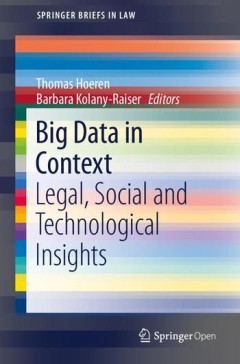
Big data in context : legal, social and technological insights
This book sheds new light on a selection of big data scenarios from an interdisciplinary perspective. It features legal, sociological and economic approaches to fundamental big data topics such as privacy, data quality and the ECJ’s Safe Harbor decision on the one hand, and practical applications such as smart cars, wearables and web tracking on the other. Addressing the interests of research…
- Edition
- -
- ISBN/ISSN
- 9783319624617
- Collation
- xii, 120p. : ill.
- Series Title
- SpringerBriefs in Law
- Call Number
- 343.099 BIG b

Big Digital Humanities : imagining a meeting place for the humanities and the…
Big Digital Humanities has its origins in a series of seminal articles Patrik Svensson published in the Digital Humanities Quarterly between 2009 and 2012. As these articles were coming out, enthusiasm around Digital Humanities was acquiring a great deal of momentum and significant disagreement about what did or didn’t “count” as Digital Humanities work. Svensson’s articles provided a w…
- Edition
- -
- ISBN/ISSN
- 9780472073061
- Collation
- xx, 279p. : ill.
- Series Title
- -
- Call Number
- 001.30285 SVE b
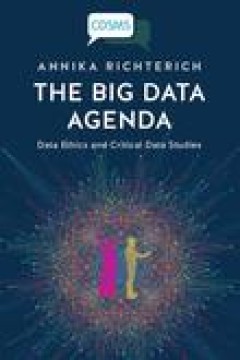
big data agenda: data ethics and critical data studies
This book highlights that the capacity for gathering, analysing, and utilising vast amounts of digital (user) data raises significant ethical issues. Annika Richterich provides a systematic contemporary overview of the field of critical data studies that reflects on practices of digital data collection and analysis. The book assesses in detail one big data research area: biomedical studies, foc…
- Edition
- -
- ISBN/ISSN
- 9781911534730
- Collation
- iv, 148 pages ; 24 cm.
- Series Title
- CDSMS (Series)
- Call Number
- 005.7 RIC b
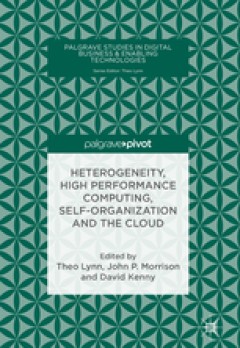
Heterogeneity, high performance computing, self-organization and the cloud
This open access book addresses the most recent developments in cloud computing such as HPC in the Cloud, heterogeneous cloud, self-organising and self-management, and discusses the business implications of cloud computing adoption. Establishing the need for a new architecture for cloud computing, it discusses a novel cloud management and delivery architecture based on the principles of self-or…
- Edition
- -
- ISBN/ISSN
- 9783319760384
- Collation
- XXI, 165 p.
- Series Title
- -
- Call Number
- 658.4038 LYN h
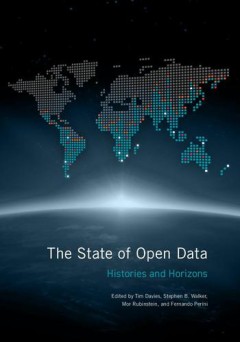
The state of open data : histories and horizons
It’s been ten years since open data first broke onto the global stage. Over the past decade, thousands of programmes and projects around the world have worked to open data and use it to address a myriad of social and economic challenges. Meanwhile, issues related to data rights and privacy have moved to the centre of public and political discourse. As the open data movement enters a new phase…
- Edition
- -
- ISBN/ISSN
- 9781928331957
- Collation
- xiii, 574p. : ill.
- Series Title
- -
- Call Number
- 070.57973 STA s

Open data in developing economies : toward building an evidence base on what …
Recent years have witnessed considerable speculation about the potential of open data to bring about wide-scale transformation. The bulk of existing evidence about the impact of open data, however, focuses on high-income countries. Much less is known about open data’s role and value in low- and middle-income countries, and more generally about its possible contributions to economic and social…
- Edition
- -
- ISBN/ISSN
- 9781928331599
- Collation
- v, 275p. : ill.
- Series Title
- -
- Call Number
- 352.38091724 VER o
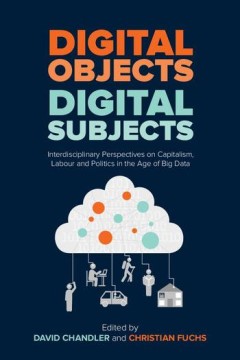
Digital objects, digital subjects : interdisciplinary perspectives on capital…
This book explores activism, research and critique in the age of digital subjects and objects and Big Data capitalism after a digital turn said to have radically transformed our political futures. Optimists assert that the ‘digital’ promises: new forms of community and ways of knowing and sensing, innovation, participatory culture, networked activism, and distributed democracy. Pessimists a…
- Edition
- -
- ISBN/ISSN
- 9781912656103
- Collation
- iv, 242p. : ill.
- Series Title
- -
- Call Number
- 303.4834 DIG g
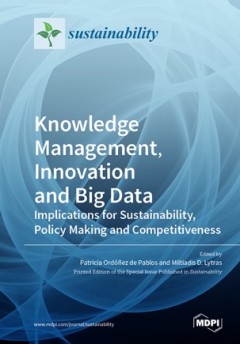
Knowledge manageation and big data : implications for sustainability, policy …
The evolution of knowledge management theory and the special emphasis on human and social capital sets new challenges for knowledge-driven and technology-enabled innovation. Emerging technologies including big data and analytics have significant implications for sustainability, policy making, and competitiveness. This edited volume promotes scientific research into the potential contributions k…
- Edition
- -
- ISBN/ISSN
- 9783039280094
- Collation
- IX< 402 p.
- Series Title
- -
- Call Number
- 300.285 LYT k

Internet research ethics
This anthology addresses ethical challenges that arise within the field of Internet research. Among the issues discussed in the book are the following: When is voluntary informed consent from research subjects required in using the Internet as a data source? How may researchers secure the privacy of research subjects in a landscape where the traditional public/private distinction is blurred an…
- Edition
- -
- ISBN/ISSN
- 9788202489519
- Collation
- 175p.: ill.
- Series Title
- -
- Call Number
- 174.90014 ENJ i
 Computer Science, Information & General Works
Computer Science, Information & General Works  Philosophy & Psychology
Philosophy & Psychology  Religion
Religion  Social Sciences
Social Sciences  Language
Language  Pure Science
Pure Science  Applied Sciences
Applied Sciences  Art & Recreation
Art & Recreation  Literature
Literature  History & Geography
History & Geography